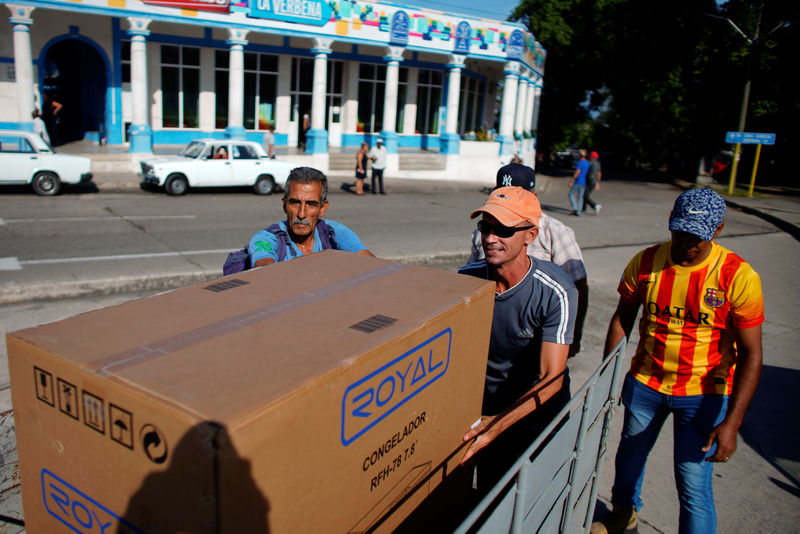By Marc Frank and Nelson Acosta
HAVANA (Reuters) - Cubans flocked to a dozen shops that opened in Havana on Monday selling home appliances and spare parts for cars in dollars, as the cash-strapped government struggles to rake in tradable currency to purchase imports and pay its debts.
Washing machines, refrigerators, freezers, air conditioners, TVs, electric motorcycles, car batteries, tires and other goods were priced well below similar offers at other state stores, when available for sale in the government's local dollar equivalent, the convertible peso.
Cuba's inefficient state-run economy is going through a liquidity crisis due to the implosion of ally Venezuela's economy and the tightening of the decades-old U.S. trade embargo under President Donald Trump.
The country is dependent on fuel, food and other imports it must purchase for tradable international currencies it earns from exports of goods and services such as sugar, tourism and technical assistance, which are all in decline.
Shortages of everything from fuel to food and medicines have plagued the country this year.
Joel Palomino, an education professor who rents out a room in his home to tourists, said he had been waiting in line at a store in the Vedado district since dawn to buy an air conditioner.
"Cubans very much need to purchase these products at a reasonable price. The government should have done this a long time ago," Palmino said.
"The prices are lower than in convertible pesos for the same products and better than those Cubans bring back from Mexico and Panama to sell on the black market," he said.
The dollar circulated freely in Cuba alongside the peso after the demise of former benefactor the Soviet Union in the early 1990s sparked a crisis in the Communist-run country. The dollar was taken out of circulation in 2004 and replaced by the convertible peso.
Two currencies, the peso and the convertible peso, which is valued at 24 pesos, circulate in Cuba. Possession of the dollar and other tradable currencies is legal, but they have previously not been deemed legal tender for purchases.
The government claims the convertible peso is equal to the dollar, but imported appliances and other goods, when available, have huge mark-ups as they must be purchased in tradable currencies while the peso and convertible peso have no value abroad.
The state has a monopoly on foreign trade and retail sales, but Cubans travel to places such as Haiti, Mexico, Panama and Russia, where they collectively spend hundreds of millions of dollars to purchase goods that they then resell in the Caribbean nation.
Local economist Omar Everleny said the stores would benefit the state and consumers alike.
"The prices are competitive with the international market as they have been reduced as much as 50% and the state is capturing internationally exchangeable money that was circulating in Cuba but then flowing abroad to purchase goods at lower prices," he said.
Everleny, like many other economists, said the stores were an admission that the convertible peso was worth less than a dollar and forecast that they marked the beginning of its end.
"We are going back to before 2004 when there was only the peso and certain products were priced in dollars," he said.
Cubans who buy from the specialist stores need a dollar-denominated bank card from an account opened with tradable currencies, such as the dollar or euro. People may obtain those tradable currencies through offshore remittances or by other means such as exchanging pesos on the street, the government said.
The government said a total of 77 outlets would open across the country in the coming days, but as of Monday just one had opened outside the capital, in eastern Santiago de Cuba.
